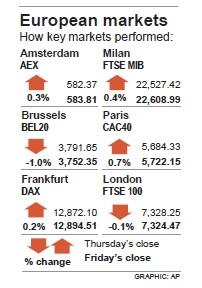A late turnaround on Friday helped European stocks notch gains for a fifth straight session, as signs of progress in US-China trade talks and upbeat reports from luxury goods makers dispelled some fears about an earnings and growth slowdown.
After starting the day nearly flat and eventually falling as much as 0.4 percent, the main European equities benchmark, the STOXX 600, on Friday recovered to close up 0.70 points, or 0.2 percent, at 398.02, jumping 1.6 percent from a close of 391.84 on Oct. 18.
Germany’s trade-sensitive DAX on Friday rose 22.41 points, or 0.2 percent, to 12,894.51, surging 2.1 percent from 12,633.60 a week earlier.

France’s CAC 40 on Friday outperformed major regional indices, gaining 37.82 points, or 0.7 percent, to 5,722.15, a jump of 1.5 percent from a close of 5,636.25 a week earlier, as Gucci owner Kering SA jumped 8.7 percent, while Italian jacket maker Moncler SpA rose 11.3 percent.
The companies joined other luxury labels in easing fears of a major third-quarter sales hit from protests in Hong Kong.
Europe’s retail index gained 1.2 percent, leading gains among major subsectors.
However, the food and beverage sector led losses on Friday, after brewer Anheuser-Busch InBev SA/NV provided a cautious outlook and reported weaker-than-expected quarterly earnings growth, sparked by reduced demand for its beer in Brazil and South Korea.
Shares in Carlsberg A/S and Heineken NV dropped about 2 percent each.
“Today’s moves seem to have trimmed some of the progress we have seen on the week,” City Index analyst Ken Odeluga said in London. “You have a mechanical effect from that 10 percent decline in AB InBev, but you can’t really generalize. We may not see a stellar earnings season, but with expectations so low there will be more beats for sure.”
The prospect of months of more wrangling over Brexit remained as the EU failed to set a date for Britain’s departure from the bloc, while the UK’s parliament squabbled over British Prime Minister Boris Johnson’s call for an election to break the deadlock.
EU ambassadors agreed in principle to a delay beyond deadline on Thursday next week, but would not decide the length of the extension until tomorrow or Tuesday, an official said.
London’s FTSE 100 fell for the first time in five sessions, while mid-caps and the pound weakened as Johnson on Thursday conceded for the first time that he could not meet his Brexit deadline.
The FTSE 100 on Friday fell 3.78 points, or 0.1 percent, to 7,324.47, but was still up 2.4 percent from 7,150.57 a week earlier.
Shares in French tire maker Michelin gained 6 percent after it maintained its full-year profit guidance, even as it cut its forecast again for the global tire market.
Among banks, Britain’s Barclays PLC rose 2.4 percent after reporting greater than expected third-quarter earnings.
Additional reporting by staff writer

Intel Corp chief executive officer Lip-Bu Tan (陳立武) is expected to meet with Taiwanese suppliers next month in conjunction with the opening of the Computex Taipei trade show, supply chain sources said on Monday. The visit, the first for Tan to Taiwan since assuming his new post last month, would be aimed at enhancing Intel’s ties with suppliers in Taiwan as he attempts to help turn around the struggling US chipmaker, the sources said. Tan is to hold a banquet to celebrate Intel’s 40-year presence in Taiwan before Computex opens on May 20 and invite dozens of Taiwanese suppliers to exchange views

Application-specific integrated circuit designer Faraday Technology Corp (智原) yesterday said that although revenue this quarter would decline 30 percent from last quarter, it retained its full-year forecast of revenue growth of 100 percent. The company attributed the quarterly drop to a slowdown in customers’ production of chips using Faraday’s advanced packaging technology. The company is still confident about its revenue growth this year, given its strong “design-win” — or the projects it won to help customers design their chips, Faraday president Steve Wang (王國雍) told an online earnings conference. “The design-win this year is better than we expected. We believe we will win

Chizuko Kimura has become the first female sushi chef in the world to win a Michelin star, fulfilling a promise she made to her dying husband to continue his legacy. The 54-year-old Japanese chef regained the Michelin star her late husband, Shunei Kimura, won three years ago for their Sushi Shunei restaurant in Paris. For Shunei Kimura, the star was a dream come true. However, the joy was short-lived. He died from cancer just three months later in June 2022. He was 65. The following year, the restaurant in the heart of Montmartre lost its star rating. Chizuko Kimura insisted that the new star is still down

While China’s leaders use their economic and political might to fight US President Donald Trump’s trade war “to the end,” its army of social media soldiers are embarking on a more humorous campaign online. Trump’s tariff blitz has seen Washington and Beijing impose eye-watering duties on imports from the other, fanning a standoff between the economic superpowers that has sparked global recession fears and sent markets into a tailspin. Trump says his policy is a response to years of being “ripped off” by other countries and aims to bring manufacturing to the US, forcing companies to employ US workers. However, China’s online warriors